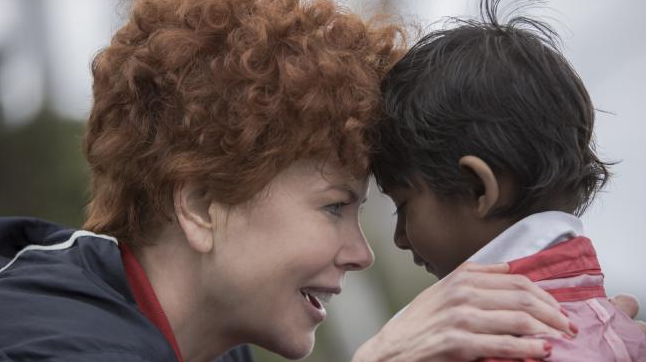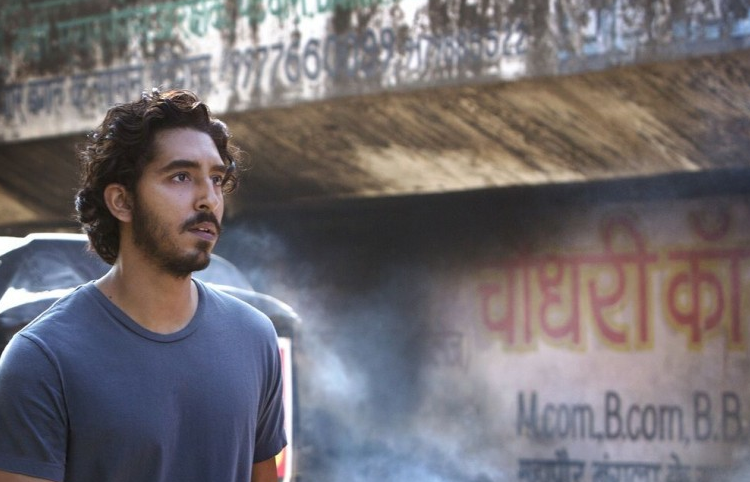There’s an obvious way and a not obvious way of telling the amazing true story of Saroo Brierley, an Indian boy who was displaced from his family by an errant train ride through India, ultimately getting adopted by a Tasmanian couple when his family could not be found. The obvious way is to introduce us right away to the actors we know – Dev Patel, Rooney Mara, Nicole Kidman, David Wenham – and make it their story, with the Indian backstory filled in as necessary through flashback. The not obvious way – like, bracingly not obvious – is to place the film’s first 45 minutes in the hands of a novice eight-year-old actor, Sunny Pawar, who tells us Saroo’s story from its Indian beginnings, before any of those familiar faces even appear. In this way, Lion represents a brash kind of confidence by a couple of Australians, screenwriter Luke Davies and first-time director Garth Davis, and delivers us a film that feels much more not-obvious than your typical awards contender.
The story is just the kind of thing someone would make into a feel-good tale of inspiration with no rough edges. A few years ago, news came out that an Australian man had used Google Earth to try to glean the location of his childhood home in India, a home he was too young to properly identify when he became separated from his older brother and fell asleep on a train that left the station for points unknown. He didn’t know his mum’s name either, and in a country the size of India, in the comparatively unconnected year of 1986, he was as hopelessly lost as a hermit crab swept up in a major ocean current and deposited on another continent. Saroo (Pawar) lived on the Calcutta streets for months before finally landing in an orphanage and getting on the radar of a pair of Australians (Kidman and Wenham) who wanted to adopt him. As an adult, Saroo (Patel) became completely preoccupied – with good reason – with the idea of trying to find the brother and mother that he assumed had been looking for him every day since.
 Lion does have rough edges, though. Mr. and Mrs. Brierley also adopted an emotionally disturbed Indian boy as a brother to Saroo, and he’s grown into an adult (Divian Ladwa) who can’t hold a job, oozes resentment and causes his mother and father constant distress. As Saroo fixates on his quest, the “good son” also loses his moorings and begins to alienate his loyal girlfriend (Mara). Saroo’s mother becomes depressed that the selfless gesture of adopting two children who needed them, rather than having their own, has rewarded her with two lost souls.
Lion does have rough edges, though. Mr. and Mrs. Brierley also adopted an emotionally disturbed Indian boy as a brother to Saroo, and he’s grown into an adult (Divian Ladwa) who can’t hold a job, oozes resentment and causes his mother and father constant distress. As Saroo fixates on his quest, the “good son” also loses his moorings and begins to alienate his loyal girlfriend (Mara). Saroo’s mother becomes depressed that the selfless gesture of adopting two children who needed them, rather than having their own, has rewarded her with two lost souls.
This is to say nothing of the roughness of the film’s first 45 minutes. This is no backlot dressed up to look like India for a few quick scenes of poverty and displacement. This is a deep dive into real India, as Saroo delves further and further into his own dislocation. There’s an intuitive desperation to the astonishing performance of Sunny Pawar, who instinctively knows when he’s on the verge of a situation going from bad to much much worse. And what Pawar does is he runs. He runs like the wind, he runs like a child, he runs from place to place, out of danger into comparatively less danger, out of harm’s way into temporary shelter. In these scenes the character we meet later on, in the form of Dev Patel, is forged. He’s a fighter and a survivor, and a privileged upbringing in Hobart doesn’t entirely strip him of these qualities.
The one certain to get an Oscar nomination is Kidman, who seems to fall in and out of favour with a fickle public but always comes roaring back with a performance like this one. She’s a raw and exposed soul, a woman trying to fill an unfillable hole in her psyche. While that kind of performance can be alienating, Kidman is so in tune with Sue Brierley’s human frailties that she becomes the most relatable character on screen – especially if you’ve ever been a parent or fulfilled a parental role. Last but not least is Mara, the potentially thankless girlfriend character who has her own weird and distinct traits and challenges Saroo in complicated ways.
 Davis’ contributions are a bit harder to quantify. He’s directed shorts and four episodes of Top of the Lake, but his feature debut marks him as a visual stylist to watch. There’s a lot of thought to the placement of the camera, a lot of mirroring of shots that link Saroo’s Australian life with his Indian one. Shot afar from the footpath of a long bridge, for example, Saroo remembers his mother walking along a similar footpath in India. Like everything else in the film, the snippets of Saroo’s memory play out in understated fashion, never hitting us over the head or manipulating our emotions. When Lion extracts emotion from us – and it does, regularly – it’s all earned.
Davis’ contributions are a bit harder to quantify. He’s directed shorts and four episodes of Top of the Lake, but his feature debut marks him as a visual stylist to watch. There’s a lot of thought to the placement of the camera, a lot of mirroring of shots that link Saroo’s Australian life with his Indian one. Shot afar from the footpath of a long bridge, for example, Saroo remembers his mother walking along a similar footpath in India. Like everything else in the film, the snippets of Saroo’s memory play out in understated fashion, never hitting us over the head or manipulating our emotions. When Lion extracts emotion from us – and it does, regularly – it’s all earned.